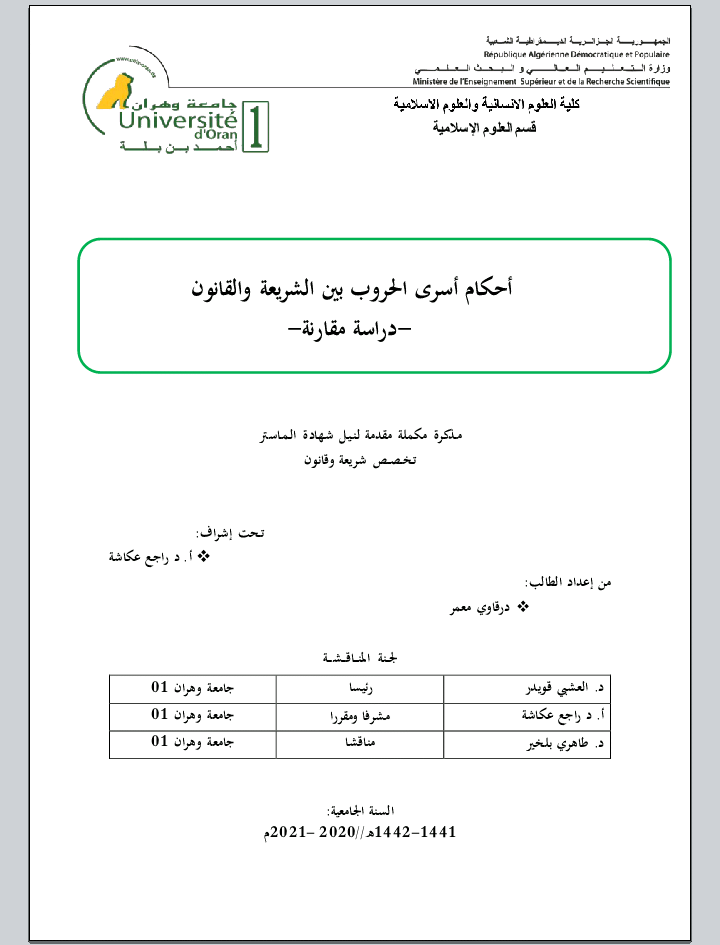
رد الإقرار بالقرائن في الفقه الإسلامي pdf
ملخص الدراسة:
All praise is due to Allah, and Allah's Peace and Blessings be upon His Final Messenger. To proceed: The Legislator subscribed the means of proof. He considered as a method of proof anything that clarifies the truth, confirms justice, harmonizes with the Sharia purposes, and helps the judge to reach the true judgment. Among the most important methods of proof is confession, which is considered as the master of evidences because of its usual truthfulness. However, this confession may contradict with other evidences and signs which should also be considered as proofs according to the scholars consensus. However, is it possible to say that these supporting proofs overweight the confession? Therefore; this study addresses an important topic in judgment, namely: rejecting confession by qara’en, accompanying evidences in Fiqh. The study firstly explained the place of these qara’en, and their validity as proofs. The study also discussed the Islamic ruling upon the use of qara’en as confirming evidences. The most strong opinion in this regard is that it is allowed to do so in the necessary cases given that those qara’en are concrete ones. The weak ones, however, may be considered as a complementary evidence. The study then explained the concept of confession rejection based on qara’en as an additional component. This is in addition to the issue of "ignoring confession due to the overweighing likelihood of lying in it as could be concluded from the associated qara’en". The study also confirmed the legality of rejecting the confession based on the associated qara’en, which is confirmed by several evidences from Quran, Sunnah, statements of the predecessors, qeyaas (comparison), logic, and the general rules of Fiqh. The study then presented the different opinions regarding rejecting the confession based on the associated qara’en, which range between prohibition, allowing, and obligation based on the type of right that will be affected. The study then presented the rationale behind rejecting the confession based on the associated qara’en which is achieving the broad objective of Sharia, which is achieving justice and restitution of rights to their owners, and then assuring security and stability in the society. The study then revealed the role of judges in rejecting the confession based on the associated qara’en starting from the time of the Prophet (PBUH), followed by the time of our righteous predecessors. This was practiced through tracing signs that reveals the truth, and investigating the background of the confession and its associated circumstances. This in addition to the deep understanding and insightfulness, which is a gift in which judges vary, but they are responsible to improve and develop it. Furthermore, judges may use tricks to examine the confession and qara’en truthfulness. He should also consult people of knowledge in the investigated issue. The strongest opinion in this regard is that if the confession contradicts the knowledge of the judge, he should then leave the case to another judge, where the first judge could be invited as a witness. After that, the study presented some applications of rejecting the confession by the associated qara’en including the textual, customary, and judicial ones in addition to several contemporary examples. The study concluded by clarifying the effect of rejecting the confession by the associated qara’en on the prescribed punishment and warranty.
توثيق المرجعي (APA)
عكيلة, نبيلة محمد درويش (2017). Refuting recognition through Presumptions in Islamic jurisprudence. الجامعة الإسلامية - غزة. 22195
خصائص الدراسة
-
المؤلف
عكيلة, نبيلة محمد درويش
-
سنة النشر
2017
-
الناشر:
الجامعة الإسلامية - غزة
-
المصدر:
المستودع الرقمي للجامعة الإسلامية بغزة
-
نوع المحتوى:
رسالة ماجستير
-
اللغة:
العربية
-
محكمة:
نعم
-
الدولة:
فلسطين
-
النص:
دراسة كاملة
-
نوع الملف:
pdf




